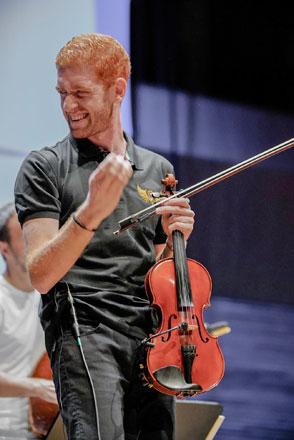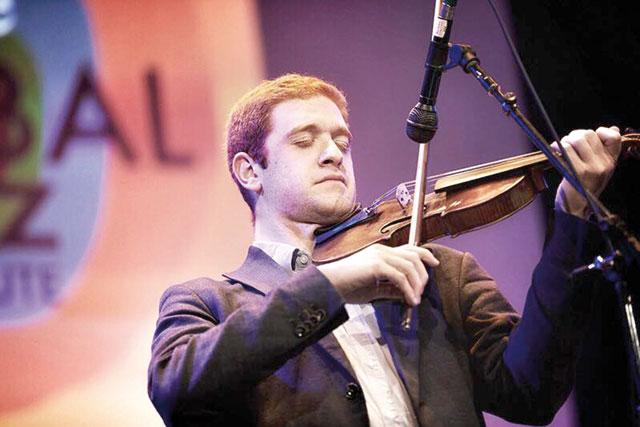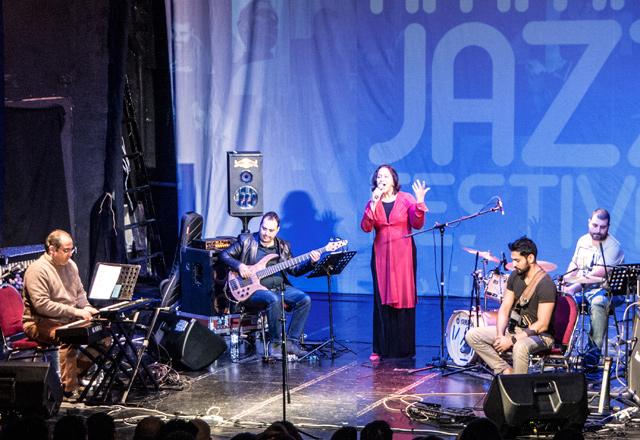You are here
‘Jordanian music is a reflection of the great Arab culture’
By Camille Dupire - Aug 06,2018 - Last updated at Aug 07,2018

Jordanian violinist Layth Sidiq plays at the international Seifert Zbigniew Jazz Violin Competition in Poland (Photo courtesy of Layth Sidiq)
AMMAN — The richness of the Jordanian culture shined last month, as musical prodigy Layth Sidiq seized the second place in the international Seifert Zbigniew Jazz Violin Competition held in Poland.
"More than a musical competition, this event was for me a platform to share my love of the Jordanian and Arab cultures, which I have been cherishing throughout my musical journey," Sidiq told The Jordan Times on Monday.
Born to a father director of the National Music Conservatory in Jordan and a violinist and music teacher mother, the 26-year-old violinist has striven to combine his Arab heritage and musical background with a modern and jazzy setting.
"Since I moved to Boston, where I am pursuing a Masters at the Berklee Global Jazz Institute, I have continuously spread the wealth of my culture of origin, and witnessed the role music can play in creating intercultural dialogue," Sidiq explained, recalling how his quartet partners kept asking him for links and recommendations of Arab musicians.
"Every chance I have to hold my violin, I feel like I am teaching a lesson and sharing my culture with the world," the young violinist said, stressing that "nothing feels better than seeing my close friends from so many nationalities get closer to my Jordanian and Arab heritage".
The only Arab in the international competition, Sidiq dedicated himself to showcasing his beloved culture and its people to the world, rather than producing "a mere musical performance".
"In addition to the two songs which had to be from the late Seifert Zbigniew's repertoire, we had the freedom to perform four compositions of our choice. I chose my creations, which are a direct result of my long term research and exploration of Arab music," he explained, adding "while Oud and Qunun [two string instruments typically used in Arab countries] are the most well known instruments in the Arab culture, violin also plays a major part and embodies some of the most iconic rhythms and musical scales".
Sidiq, who now identifies to a combination of such rhythms and jazz, recounted "initially, those two genres seemed so diametrically distant to me but, after years of work, including with my friend Palestinian-American Simon Shaheen, I delved into a new musical identity which I sought to present to the jury".
He said one of the best compliments he received was from one man who attended the performance of the five finalists and who told him "after hearing you play, I want to learn more about your country and your culture".
"This is for me the greatest prize: to know that someone who might have had misconceptions about Arabs, is now curious to know more about our culture as he fell in love with the story behind the notes," the violinist rejoiced.
"I am so proud to have been able to represent Jordan on a world stage, not only in terms of music, but as a country and the people embodying it. I even wore Jordanian fabrics coming directly from the Kingdom, as well as a flag of Jordan sewn into my white shirt," he remembered, voicing great hopes for the future of Jordanian music.
Related Articles
AMMAN — Born to a father director of the National Music Conservatory in Jordan and a violinist and music teacher mother, 26-year-old Layth S
AMMAN — The enchanting notes of Italian composer Mario Castelnuovo Tedesco on Wednesday resonated at Al Hussein Cultural Centre in Ras Al Ai
AMMAN — Amman’s eighth annual jazz festival launched on Friday evening at Al Shams Theatre, with seasoned Jordanian jazz pianist Omar Faqir

















